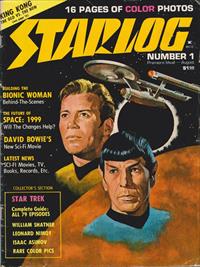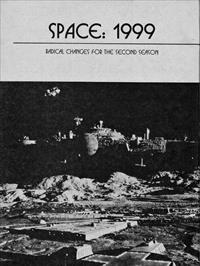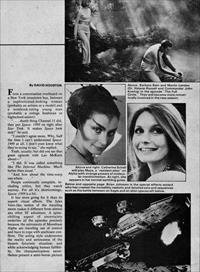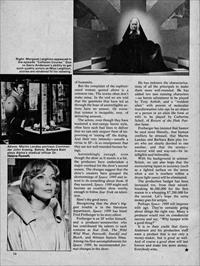Criticism
Radical Changes for the Second Season
by David Houston
Starlog Number 1(Aug 1976) p12-14
This influential series review appeared in the first issue of Starlog magazine. Although critical, it makes some good points and has some positive things to say. A larger article appeared in the following issue.




From a conversation overheard on a New York crosstown bus, between a sophisticated-looking woman (probably an actress or a model) and a notebook-toting young man (probably a college freshman or high school senior):
"...dumb thing Channel 11 did, they put Space: 1999 on right after Star Trek. It makes Space: 1999 look sick!" he said.
"I couldn't agree more. Why, half the time I can't understand Space: 1999 at all. I don't even know what they're trying to say," she replied.
"Yeah, usually; but did you see that great episode with Leo McKern about- "
"I did. It was called something like 'The Infernal Machine.' Much better than usual."
"And how about the time-warp one where...."
People continually complain, including critics, but they watch anyway. For all its shortcomings, Space: 1999 is a hit.
It has more going for it than its superb visual effects. The Jules Vern-like notion of the travelling moon makes it different from almost any other SF adventure. A spine-chilling aspect of uncertainty underlies all the episodes precisely because the astronauts of Moonbase Alpha are travelling out of control and have to cope with unchosen conflicts. The acting style underscores the reality and seriousness of the bizarre futuristic situation; and while acknowledging human fallibility, the characterizations nevertheless present a semi-heroic picture of humanity.
But the complaint of the sophisticated woman quoted above is a common one. The stories often don't make sense. In the end we are told that the questions that have led us through the hour of unintelligible actions have no answer. Or worse: that science is incapable, ever, of delivering answers.
The actors, even though they have mastered a non-campy heroic style, often have such bad lines to deliver that we can only suspect them of improvising or "tossing off" the dialogue. And their very intensity- usually a virtue in SF- is so omnipresent that they are not well-rounded human beings.
Astonishingly enough, even though the show as it stands is a hit, the producers have undertaken a major overhaul for the show's second season. The changes suggest that the show's creators have grasped the shortcomings of Space: 1999 and intend to do something about them. If they succeed, Space: 1999 might well become an excellent show worthy enough to follow Star Trek on television.
Here's the good news:
Recognizing that the show's biggest trouble is in the literature department, Space: 1999 has hired Fred Freiberger to be story editor.
Freiberger is an SF writer himself, and a producer/screenwriter who has contributed his talents to such ventures as Star Trek, The Wild Wild West, Petrocelli, Starsky and Hutch, and thirteen feature films. Among his first accomplishments for Space: 1999, he recommended format changes in the show:
He has redrawn the characterizations of all the principals to make them more well-rounded. He has added two new running characters- an heroic adventurer to be played by Tony Anholt, and a "resident alien" with powers of molecular transformation (she can be an object or a person or an alien life form at will) to be played by Catherine Schell, of "The Return of the Pink Panther" fame.
Freiberger has insisted that humour be used more liberally, that human conflicts be stressed, that Martin Landau and Barbara Bain play lovers who are clearly devoted to one another, and that the stories- however wild and way out- be intelligible and believable.
With his background in science-fiction, we can also hope that the excruciating lapses in accuracy (such as a lighted surface on the moon when a sun is nowhere within a dozen light years) will be eliminated.
The production budget has been increased too, from their record breaking $6,500,000 for the first season to a whopping $7,200,000 for the second. Let's hope the extra money goes for scripts.
Perhaps Space: 1999 will improve with age. They're certainly going about things the right way. Many a producer would rest on commercial success and say, "Why tamper with a good thing?"
It is to their credit that Gerry Anderson and his production staff want a product that is not only a money-maker, but is GOOD as well. And of course a GOOD show will last forever and make lots more money. Everybody wins.